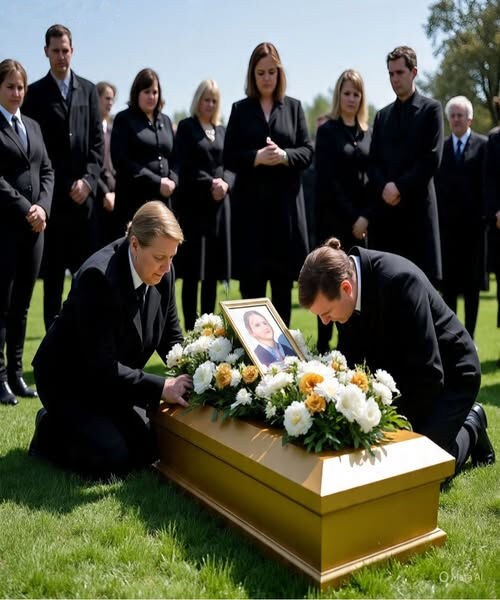The rain tapped steadily against the tin roof, echoing like a quiet drumbeat of grief. In the center of the courtyard sat a pale yellow coffin, balanced gently atop two wooden stools. Around it, mourners stood in silence, heads bowed, tears falling freely for the young woman who had died far too soon during a difficult, premature delivery.
She was just 25 years old.
Since the day she joined the family, she’d been respectful, gentle, and full of warmth—treating her husband’s parents with the same love she gave her own. Her mother-in-law often said proudly, “She’s not just my daughter-in-law—she’s like my own child.”
Then, tragedy came swiftly.
Late one evening, she collapsed, crying out in pain. By the time they reached the hospital, it was too late.
The baby was stillborn.
And she… never woke up again.
The family was shattered. Her mother-in-law fainted repeatedly from the grief. Her father-in-law sat in stunned silence, staring at the smiling portrait resting against the coffin.
When it came time to move her, eight men stepped forward. Strong, capable men. But as they braced themselves to lift the casket… it wouldn’t move.
They strained. Faces red. Arms shaking.
Still, it didn’t budge.
Someone whispered, “She’s not ready to go. Something is holding her here.”
A monk, standing nearby, stepped forward. “Open the coffin,” he said quietly. “Her spirit may still have something left to say.”
With hesitant hands, the lid was slowly lifted.
A wave of gasps followed.
Her face looked peaceful… but streaked with two faint trails of dried tears. Her eyes were closed, but her lashes still damp.
Madam Hong, the mother-in-law, collapsed beside her, grabbing her hand, trembling. “My child… please don’t cry anymore. If there’s something you need to say, say it now. We’re listening.”
No one moved.
Then a sudden, heart-wrenching sob broke the silence.
It was her husband.
He fell to his knees, burying his face in his hands, weeping uncontrollably.
All eyes turned to him in confusion. Madam Hong’s voice broke as she asked, “Son… what is it? Did she say something to you?”
His voice was hoarse as he finally looked up.
“She wanted to go… and I wouldn’t let her.”
The crowd froze.

Madam Hong blinked, confused. “Go? Go where?”
Ranon, her son, wiped his eyes. “Three months ago… she asked to return to her parents’ home for a little while. She said she felt uneasy, like something was wrong. That the baby wasn’t moving like before. She had nightmares. She was scared.”
He stared at his hands.
“But I thought she was just tired. Emotional. I told her not to worry so much—that everything was normal.”
Silence fell over the crowd. Even the monk lowered his head in quiet respect.
“She asked again the next day. Said she just wanted to see her mother. To rest. I told her we couldn’t afford for her to be away long. That my parents would be upset if she just left without notice.”
Ranon’s voice cracked.
“She didn’t argue. She just nodded. Quietly. The next morning, she made me breakfast like always. Kissed my cheek. Never brought it up again.”
His eyes welled again. “That night, I found her crying in the laundry room. She didn’t know I saw. And still—I said nothing. I walked away…”
Thunder rumbled in the distance. The rain, steady and rhythmic, echoed softly across the tarp overhead.
A woman in the crowd leaned toward her neighbor and whispered, “She must have known something…”
Ranon continued, trembling.
“The day she went into labor, she kept saying it was too soon. She begged me to take her to a different hospital. She said something didn’t feel right. But I told her she was overreacting. That there wasn’t time to argue.”
He swallowed hard.
“She didn’t resist. Just looked out the window… and that was it.”
He covered his face again, unable to speak.
Madam Hong placed a shaky hand on his back. “You didn’t know. None of us did. We thought she was just anxious. How could we have known…”
The monk stepped forward. “Those who carry the heaviest burdens often wear the calmest faces.”
Suddenly, something changed.
The air around the coffin seemed lighter. The pressure that had gripped the space loosened its hold.
The men stepped forward again.
This time, the coffin lifted.
Not easily, but it rose.
Gasps swept through the mourners. A few cried openly. Others simply closed their eyes, whispering quiet apologies into the rain.
Later that night, after the ceremony, Madam Hong sat beside her son on the quiet porch.
“I can’t stop thinking,” she murmured, “about how she’d make tea when I was sick. Or how she waited up for us when we came home late from the market.”
Ranon nodded. “She did those things even when we weren’t speaking. Always thinking of others.”
He pulled out a small paper from his pocket. “I found this in her apron last week. I think she wrote it right before…”
Madam Hong took it with shaking hands and unfolded it.
“If anything happens, tell my mother I forgive her. And please, take care of my boy. He doesn’t always show it, but his heart is good.”
They stared at the words.
“She knew,” Madam Hong whispered.
“I should’ve listened,” Ranon muttered. “I should’ve…”
She touched his hand gently. “Then listen now.”
He looked up, puzzled.
“Let her legacy guide you. Guilt can drown you. Or… it can change you.”
Time passed.
At first, Ranon could barely get out of bed. But then, one morning, he stepped into the unused nursery. Dusted off the crib. Held the tiny clothes she’d folded so carefully. And he cried.
But he didn’t stop there.
He went to visit her mother—the one she’d wanted to see before she died. He brought flowers. Said he was sorry.
Her mother didn’t speak much—just held him and wept.
Something shifted inside him after that.
He left his job at the warehouse. Enrolled in nursing school. She had always said he was meant to do more.
People laughed. Said he’d drop out.
But he didn’t.
He delivered groceries at night to pay for classes. Studied on buses. Volunteered at clinics.
Sometimes he’d cry in stairwells. But he kept going.
Three years later, during his graduation, Madam Hong sat in the front row, clapping through tears. Beside her, Nari’s mother smiled quietly, her hands trembling.
After the ceremony, he took them to the hospital where it all happened.
He asked to speak to the head nurse.
“I’d like to donate something,” he said. “To start a small fund for expectant mothers. For emergency second opinions or transfers.”
The nurse blinked. “What should we call it?”
He smiled, weary but at peace.
“The Nari Fund. That was her name.”
Years later, the fund would help over 80 women receive urgent care they otherwise couldn’t afford. Some sent letters. One read:
“Without that transfer, my baby and I wouldn’t be here. Thank you.”
Ranon kept every letter in a small wooden box. Right next to her apron.
As for their home, it stayed quiet—but warm.
Madam Hong tended the garden Nari once dreamed of planting. Basil, marigolds, lavender.
Neighbors often said the house felt lighter now. As though it had been through pain… but found peace.
Because grief doesn’t just break—it reveals. It opens space for rebuilding.
Ranon never married again—not because he gave up on love, but because, in his way, he was still living for the love he’d lost.
Each year on Nari’s birthday, he lit a single candle by her grave.
And every year, he whispered the same words:
“I hear you now. I see you. Thank you for forgiving me.”
Grief doesn’t always fade. But meaning can grow in its shadow.
And in that meaning… healing begins.




